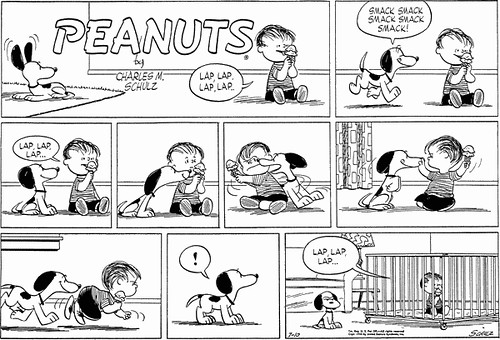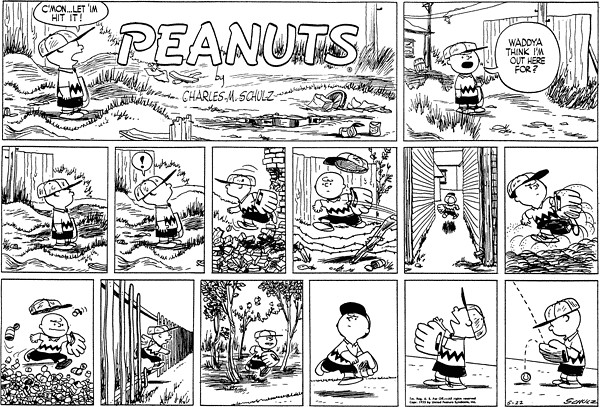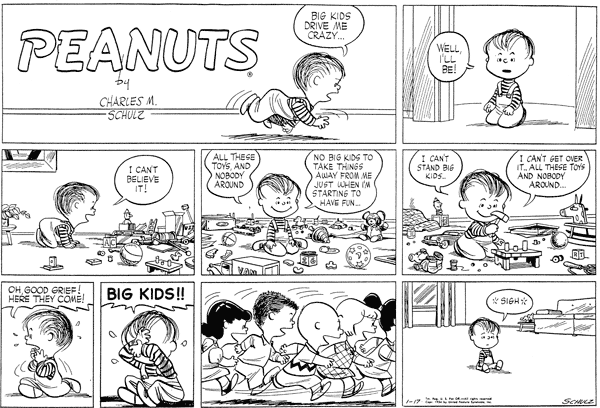Tuesday, July 31, 2012
July 10-16, 1955: Snoopy and Croquet
How did Linus get into that crib so easily? Other than that, not a lot to say about this. Except maybe that "lap, lap, lap" and "smack, smack, smack" seem a little weird.
July 11:
Up to this point, class distinctions haven't really entered into Peanuts that much. We had that strip in which Shermy plays with his elaborate train set, then Charlie Brown goes home to play with his simple oval. This is just another version of that really. Still, it takes some effort to piece it together, but one can eventually detect a continuity effort to depict Charlie Brown's family as less well-off as the other kids. This comes to a head in a memorable Sunday strip in which Violet, after bragging about her dad, is dressed down quite effectively by Charlie Brown showing her where his barber dad works.
July 12:
Well you know what they say a stopped watch is still right twice a day, unless it's a daylight savings day, in which case it is possible that it could instead be right one or three times depending on circumstances.
July 13:
Snoopy seems to have an innate perching instinct which eventually finds expression atop his doghouse.
July 14:
Snoopy is a fun character to see in weird poses, which I suspect is the inspiration behind his imaginative flights of fancy in upcoming years. He's not there yet, but this is a step along the way.
July 15:
As Snoopy becomes more "filled out," and more humanoid, he also becomes much less mobile, which I think eventually comes to harm the fun of the character. Well, you're free to disagree with me.
July 16:
I'm reminded of that earlier Sunday strip in which Charlie Brown fills a wading pool from a hose, runs over to turn off the water, comes back to find Snoopy sitting in the water, and is so disgusted that he empties the pool and starts over. What's wrong with Snoopy sitting in the pool too? Is it wet dog smell?
Sunday, July 15, 2012
Sunday, June 12, 1955: Chomp Chomp Chomp
Monday, April 2, 2012
May 22-28, 1955: Scenes from an Illustrated Childhood
Shades of Calvin and his bicycle here. And a scribble of ire!
A character displaying affection, love, tolerance, pleasure, joy? These things are not funny. Conan! What is funny in life?
Lucy turns into quite the feminist later on, this attitude turns out to be fairly atypical of her.
It's possible to miss it if you just glance at the strip, but the joke here is that Lucy is missing one skate, which is the one that Snoopy's riding.
Violet and her mud pies again. Old habits die hard. Y'know, I don't remember if we've ever seen any of the Peanuts kids eat one of those mud pies. I'd assume that they're just playing, but that look of distaste on Charlie Brown's face implies that he at least has considered eating one of the things. I guess kids had stronger immune systems back then.
Wednesday, January 4, 2012
March 21-26, 1955: What did you expect?
March 23
March 24Another serif'd word, the "Hey" in Lucy's speech in the first pane. I wonder what it was that inspired Schulz to use serifs for emphasis.
March 25This strip is the beginning of the long war between Snoopy and Linus -- to the victor goes the blanket. Snoopy may hate cats, but he's definitely picked up this maneuver off of one of them.
March 26
Friday, December 2, 2011
February 28-March 5, 1955: Everybody look down, it's all in your mind
Tuesday, November 22, 2011
Sunday, February 20, 1955: Lucy's not the most discriminating thinker
Monday, November 21, 2011
February 14-19, 1955: Snoopy hates that balloon
February 15Modern times. If this strip were updated for the present day Charlie Brown's farm would probably be industrial agribusiness.
February 16
February 17
February 18
February 19
Monday, September 19, 2011
November 15-20, 1954: I've known people like that
This strip begins a sequence where Charlie Brown frets over Lucy's willful ignorance of the world. Coupled with the Sunday strip we just saw, I think we're now just at the beginning of Peanuts' "classic" period, where Schulz comes to more fully inhabit his characters and deal with them as people, with developing personalities.
Sarcasm is no use; Lucy is impervious to it.
One interesting thing about this sequence is that Charlie Brown is depicted as really worked up over Lucy's ignorance. Could it be that she's trolling him? From a modern perspective, from all the willful ignorance we see in the world today, I think I sympathize with Charlie Brown a bit more here.
For some reason here, I imagine Lucy as Stephen Colbert and Charlie Brown as one of his guests. That's a pretty funny drawing of Charlie Brown there, although it seems to suggest he might have a neurological condition.
Panel three here, that's one of the most frustrated looks we ever get out of Charlie Brown, I think. Later on he's more the type to suffer with a sigh, but he boils over here.
To finish out the week, a bit of silliness with Snoopy. Every one of these drawings of him is a winner, but I especially like the ones in the first and last panels. Peanuts have to be drawn carefully, I'd say; the characters depend heavily on the angle they are viewed at to read properly. This is actually true of most comic strips, but it's especially true of Peanuts. If the top of Snoopy's head were facing away from the reader in the last panel, I'm not sure there's any way he could be drawn that would read well. (Although it's entirely possible there IS such a way; I just can't think of it.)
Friday, September 16, 2011
November 7, 1954: Linus Van Pelt: Master of Card Houses and the Slow Burn
Read this strip at gocomics.com.
Lucy is such a caring and supportive sister. Her laughter consists of the serif'd letters of malice.
I love how Linus carefully puts all the cards back in the pack before throwing it at Lucy.
Friday, July 22, 2011
Week of July 12-17, 1954: Pig-Pen
It's funny, but before Linus comes on the scene, Lucy fills many of the same rolls, as someone Charlie Brown can just talk to. Maybe that's why she's so cruel to Linus.
He's here! This is Pig-Pen's first strip, and it's also the first real sequence in Peanuts, by which I mean, a good number of strips in a row that all deal with the same thing. Schulz has done multiple strips on a topic many times up to this point, but he's spread them out. (Lucy in the Golf Tournament could be considered such a sequence I suppose, but it's only over Sunday strips.)
Pig-Pen is also the first of a long long of minor characters. (Unless you could the realistic bird that harassed Snoopy recently, who has been seen once before.) And he's the most persistent of all of Peanuts' side cast. Sometimes months or even years may go between appearances, but Schulz never completely forgets about the kid. Contrast this with Charlotte Braun, or 5, or Roy, or Molly Volley. Pig-Pen is also longer-lived than most later major characters. Frieda appears frequently for a while, as does Eudora for a while, but both of them eventually fade into obscurity, while Pig-Pen remains, as steady as the earth with which he is covered.
Pig-Pen's annoyed statement that he doesn't have a name is funny, but is largely accurate. We never, to my knowledge, get a name for him.
Notice that it's Patty that first meets the kid. Violet and Lucy were first met by Charlie Brown. Schroeder was first met by Patty off-stage, but his first strip also had Charlie Brown. There! That's enough OCD for one day....
Patty describes Pig-Pen as "little," putting his age less than both hers and CB's. We don't yet have any information on whether Lucy is older or younger. While the ages between characters tend to compress over time, the order remains the same I think. This puts the order of ages at (">" means "is older than"):
Shermy & Patty > Charlie Brown > Violet > Schroeder > Pig-Pen & Lucy > Linus
Pig-Pen is the most zen-like of Peanuts' cast, even more so than Linus I think. He's a one-joke character but is very self-assured in his quirk. He sees absolutely nothing wrong with his messiness, he's comfortable with it, and I think there's something admirable in that.
Pig-Pen also has a sense of humor about himself. That implies being able to see himself from others' perspective, which itself implies maturity. Alternatively we could consider that this means he's internalized his messiness and considers it an alterable part of his personality, which could be regarded as a problem.
Snoopy's got word bubbles for his thoughts again. He actually uses them here while around another character; we're expected to see, I think, that his comments are a kind of internal monologue, presented theatrically.
Pig-Pen must spend a substantial amount of his time in the cleanliness/messiness cycle. Again, he is fully cognizant of his "fault," and doesn't consider it a fault at all. Later strips make it clear that Pig-Pen's dirtiness is actually a quasi-magical attribute; he gets dirty just walking down the street.
Pig-Pen's untied shoes are a nice touch.
Saturday, June 4, 2011
Sunday, March 21, 1954: Eight stages of grief
Read this strip at gocomics.com.
Beginning with panel eight:
1. Shock
2. Disbelief
3. Confirmation
4. Anger
5. Blankness
6. Taking off your shirt(?)
7. Wide-mouthed frowning
8. Sighing
They might not be the official stages, but they work for Charlie Brown.
This is possibly the most directly hostile act so far seen in Peanuts. It would be worthy of Lucy. There are no extenuating circumstances, and nothing sets Patty off, yet she accomplishes her self-appointed task with relish. It's kind of out of character. Even when she's part of the team act with Violet against CB, their methods are less overt.
Switch the gender roles here and the strip would turn out quite different. Even this early, it doesn't seem to be in Charlie Brown's nature to do something this mean. It's the kind of thing Calvin might do to Susie, but not without some form of judgmental comeuppance from the cartoonist.
Monday, May 23, 2011
February 26, 1954: Charlie Brown Cartoons Again
Read this strip at gocomics.com.
Another "Charlie Brown, Cartoonist" strip. Schulz used these a lot both to poke fun at himself and, perhaps, at other cartoonists. At the time, I think he was still working at Art Instruction, Inc.
This strip is interesting for other reasons though. The look on Schroeder's face the whole time is fascinating. He isn't upset in the last panels; it's more like he thinks Charlie Brown has rejected him. Or maybe he's just sad that his criticism didn't find reception in CB's round head.
Sunday, April 24, 2011
January 16 & Sunday, January 17, 1954: Trials of a Baby
Sunday, January 17, 1954:
Surprisingly many of Peanuts characters have a special talent, one that overrides the limitations of real life. Snoopy has many such "powers." The force of Lucy's anger (later on) is terrifying to behold. Charlie Brown's ability to lose has already been been demonstrated while playing checkers. And Linus has a way of making or doing things that doesn't seem quite "right." Stacking the blocks like he does in the first strip is an example. He's also great at blowing up balloons halfway, and other unlikely feats of what I'm going to call, for lack of a better term, dexterity.
The second strip is the first time we get something akin to a stream of dialogue from Linus. Until now his words have been things like "dottie dottie" or loud laughs of derision in the face of Lucy's selfishness, but here are several full sentences. Noteworthy, however, is that although his words are in speech bubbles so generally are Snoopy's, and neither character has been shown using full sentences to communicate with the other characters.
I like how big kids are represented as running in herds that clean the floor of toys in their wake, like cattle devouring whole fields of grass.



















































